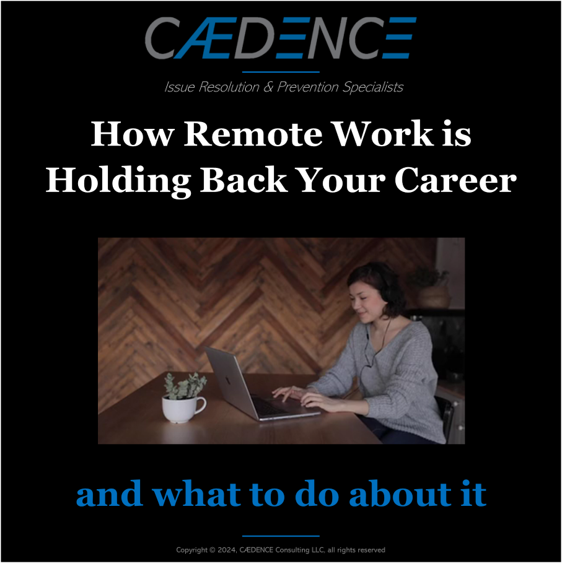How Remote Work is Holding Back Your Career

Remote work - you love it for the flexibility, convenience, and time & cost savings, but have you thought about the longer term impact it's having on your career advancement?
Traditionally, the skills you need to grow your career were transmitted by informal mentoring during daily face-to-face interactions with managers and colleagues. Skills development and influencing happened in offices, in the cafeteria, and during chance meetings in the hallway.
As we all know, the world has changed. Working from home several days per week (or working in a different city from your teammates) means that the traditional informal mentoring system has broken down. Face to face interactions are far less frequent and spontaneously bumping into someone is even rarer. That way of expanding skills and influence simply doesn't exist anymore.
So how should you deal with this problem? The first thing is to actively cultivate a mentor-protégé relationship with your manager or a senior colleague. (Or if you’re a manager, facilitate these relationships among others.)
When seeking a mentor, many people focus first on “what do they know”, but we find it’s ultimately more beneficial to focus on “do I trust them enough to open up and be candid about my concerns?”. (If you’re a manager matching mentors with protégés, weigh the interpersonal chemistry between the people higher than their specific skillsets.) Also, don’t expect your mentor to set meetings, establish agendas, or otherwise “drive” progress – that’s the protégé’s responsibility. Mentors are busy with their day jobs, and they’re already carving out time to guide you. Setting logistics and focus areas is up to you.
If you can’t find the right match with an internal mentor, or if you’ve exhausted their expertise (or as a manager if you just don’t have enough senior people to serve as mentors), consider getting some outside help to fill the gap. CAEDENCE provides experienced, high performing engineering and business leaders to mentor and coach up-and-coming high potential leaders.
Our leadership development program, "Lead On!™", is offered in affordable 3-month blocks. Based on our proprietary assessment tool, each participant receives a customized experience. We coach, setting high expectations and driving performance improvement and we mentor, developing leadership and management skills and drawing on our extensive catalog of workshop materials.
Packages are available suitable for companies or individuals in one-on-one or group formats. We are now accepting candidates for the next wave. Contact us for more information.

Over the years we’ve been exposed to Six Sigma, Juran, Deming PDCA, 8D, Dale Carnegie, A3, Shainin, and more. Each technique works pretty well, and has been demonstrated many times in a wide variety of industries and circumstances. At the core they are all essentially the same!
Each approach relies on an underlying logical flow that goes like this: [a] make sure the problem is clearly defined; [b] be open to all sources of information; [c] vet the information for relevance and accuracy; [d] use the process of elimination to narrow down all possible causes to the most likely few; [e] prove which of the suspects is really the cause of the issue; [f] generate a number of potential solutions; [g] evaluate the effectiveness, feasibility and risk of the potential solutions; [h] implement the winning solution(s); and [i] take steps to make sure your solution(s) don’t unravel in the future.
The differences between the paradigms resides in supplementary steps and toolkits. For example, 8D contains the important “In









